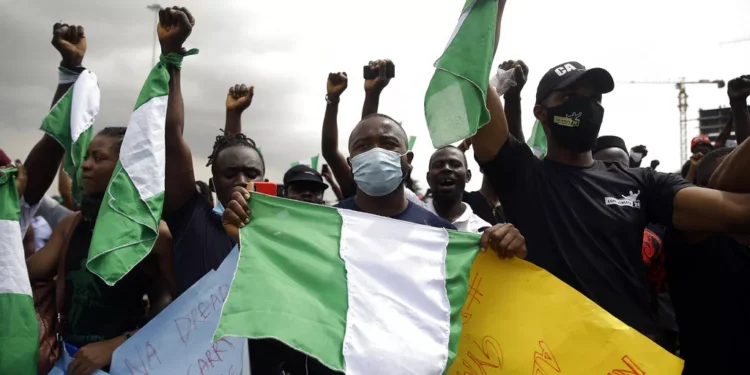In the coming days, Nigerians are poised to take to the streets in a series of public demonstrations that reflect deep-seated discontent with the nation’s governance. These protests are not merely reactions to recent events but are the culmination of prolonged frustration with a leadership that has persistently failed to meet the needs of its citizens.
Unlike some of his peers, one observer stands in support of this large-scale protest, provided it remains peaceful and orderly. This movement advocates for leadership that is patriotic, visionary, and compassionate—one that listens, comprehends, and acts in the best interests of its citizens, prioritizing their welfare above all else.
Since the inauguration of President Bola Ahmed Tinubu’s administration, Nigerians have faced significant hardships. The array of policies and programs implemented by the Tinubu administration has, arguably, exacerbated the plight of ordinary Nigerians.
President Tinubu’s approach—ending the subsidy regime and allowing the naira to float—was intended to rejuvenate the fragile economy but appears misguided. These policies, reminiscent of draconian measures, have made basic necessities increasingly unaffordable. The removal of fuel subsidies has led to soaring prices for transportation and goods, while the devaluation of the naira has increased the cost of everyday transactions, straining the already limited financial resources of the average Nigerian.
In response to these harsh realities, Nigerians are organizing a nationwide protest set to occur from August 1 to 10, 2024. This protest is more than an outcry; it is a desperate plea for change.
The populace is unequivocally stating, “Enough is enough!” They demand the reversal of these debilitating policies and a shift towards more inclusive and supportive governance. Despite concerns that the demonstrations might devolve into violence, reminiscent of the 2020 EndSARS protests, these fears will not deter Nigerians from expressing their dissent against the ruling elite’s perceived tyranny.
The EndSARS movement serves as a stark reminder of the potential consequences when peaceful protests are met with brutality, yet it also underscores the resilience and determination of the Nigerian people. It is imperative that the federal government and security agencies ensure the safety of the protesters rather than resort to threats or arrests.
The government must protect the rights of its citizens, including the right to peaceful assembly. Any attempt to suppress these protests through force would likely intensify discontent and escalate the situation.
Furthermore, addressing the root causes of these protests is crucial. The government must heed the grievances of its citizens and take immediate steps to alleviate their suffering. This includes reconsidering and potentially reversing harmful economic policies, implementing measures to reduce the cost of living, and ensuring that essential services are accessible and affordable.
Ultimately, addressing the protesters’ concerns and demands will be far more effective in restoring peace and stability than using force against innocent citizens striving for a better Nigeria. The government must recognize that these protests are a cry for help, a call for justice, and an opportunity to rebuild trust with its people.
Only through genuine dialogue, understanding, and responsive action can the government hope to resolve the underlying issues and foster a more harmonious and prosperous Nigeria.
*Short-Term Remedies to Agitations and Protests*
1. Immediate implementation of the national minimum wage and payment of arrears.
2. Reduced costs and a price control mechanism to curb speculative rises in food and household commodities.
3. Revisit the pump price for petroleum products while introducing alternative sources of energy.
4. Public engagement through strategic communication that holistically addresses all stakeholders’ concerns.
5. Reconfigure the federal cabinet to create a sense of belonging among all Nigerians.
National protests, such as the impending demonstrations in Nigeria, serve as a critical means for citizens to express their grievances and demand accountability from their government. These protests, while necessary for democratic expression, come with significant consequences that need careful consideration and management.
The initiative of Nigeria’s security agencies in addressing the agitation with a non-kinetic approach is commendable. The Department of State Security’s engagement through public advocacy demonstrates a constructive and proactive response to public discontent. Such measures help in de-escalating tensions and fostering a dialogue between the government and the citizens.
The Nigeria Police’s alignment with these efforts, alongside the Nigerian Customs’ decision to suspend tariffs and duties on household commodities, marks a positive step towards alleviating the immediate economic pressures faced by Nigerians. This suspension can provide much-needed relief to households struggling with the high cost of living, demonstrating the government’s responsiveness to the needs of its people.
These actions reflect an understanding that forceful suppression of protests often leads to further unrest and violence. Instead, by adopting a strategy that prioritizes communication and economic relief, the government and its agencies are laying the groundwork for a more peaceful and constructive resolution to the issues at hand.
However, these measures must be part of a broader, sustained effort to address the root causes of the protests. Short-term remedies, while necessary, must be complemented by long-term solutions that tackle the systemic issues contributing to public dissatisfaction. This includes comprehensive economic reforms, increased transparency, and inclusive governance that ensures all citizens feel represented and valued.











